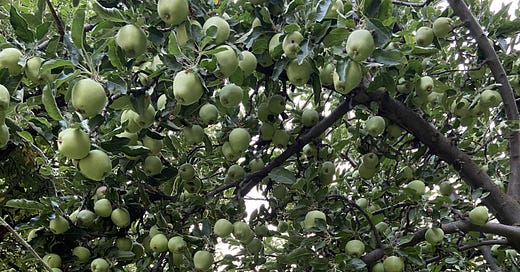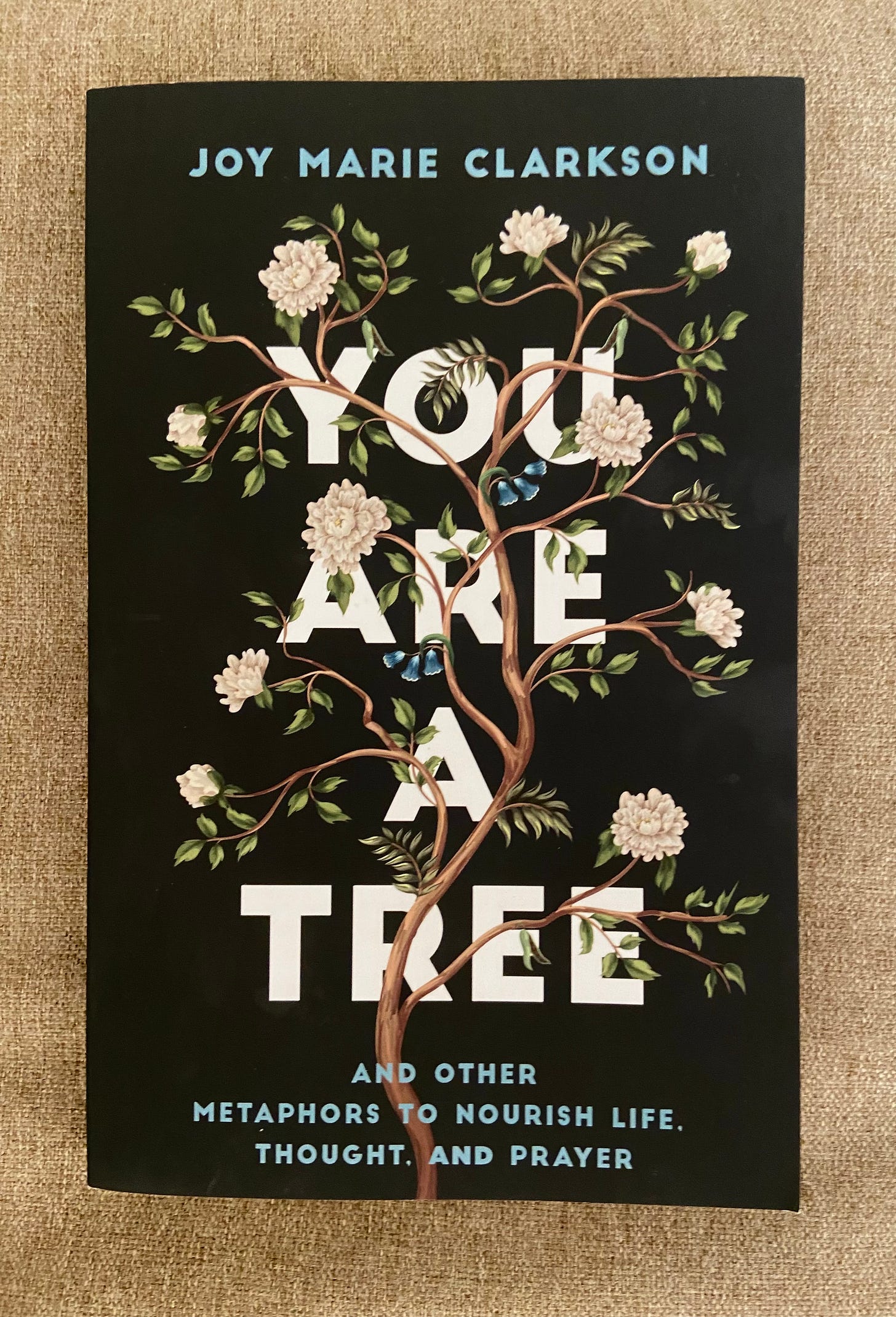“I am the true vine, and my Father is the vinedresser. Every branch in me that does not bear fruit he takes away, and every branch that does bear fruit he prunes, that it may bear more fruit.” John 15:1-2, ESV
Greetings Friends,
We are midway through August and in my little corner of the world, as you can see, apples are currently abounding. I took this photo two weeks ago while marveling over this year’s bounty. This is by far the most fruit we’ve seen on this tree since we’ve lived here.
Our family moved to our current home in 2020, the financial spending freeze of the pandemic finally allowing us the opportunity to secure a tiny piece of land. The little half acre came with several varieties of mature fruit trees: cherry, apricot, pear, and two different varieties of apple.
The first autumn brought a decent harvest from our apple trees, but we’ve had a (mostly) steady decline since. My husband has pruned a bit over the past few years, but in early March, this particular tree had a severe meeting with the shears.
The result is quite stunning, and I’ve been thinking about it.
I recently read Darkness Calls the Tiger by Janyre Tromp. The title was released in May of this year and tells the story of a coming-to-age woman, who is raised on the mission field by her widowed father, and a new-to-the mission-field young man as they navigate the horrors of World War II Burma.
What I loved about this book, beyond the evocative setting and storytelling, is the raw faith portrayal of both protagonists. The characters struggle. Deeply. In the midst of tremendous suffering, they continually question and doubt God’s presence and goodness.
The boiling pot of their circumstances also brings them face-to-face with their own weaknesses. While there is a redemptive ending, it comes amid great loss. The ending is hopeful, but not tidy. I can’t tell you how I appreciated this.
But what, you may ask, does this have to do with the apple tree?
As some readers know, many moons back my husband and I were missionaries in a third world country. We lived abroad for four years. Our two oldest sons, now 20 and 18, were two and three months old when we embarked on the adventure. We had our third son overseas a little over a year later.
It was an intense season of life, as you can imagine, and the characters’ struggles in Darkness Calls the Tiger brought my own wrestling from that period back to the surface.
With the continual aim for transparency, I will tell you that I wasn’t a particularly stellar missionary. I tried to be faithful to what God called me to, and in some ways, I suppose I succeeded. But I also complained a lot. From a strictly fleshly perspective, there were so many valid reasons to do so.
For one thing it was hot. We lived in the Middle East where the winter lows hovered in the seventies, so you can imagine the summer temperatures. Hot weather and I weren’t compatible—still aren’t. To be honest, mid-summer in southern Idaho isn’t much better, but we have air conditioning. Wonderful, glorious air conditioning. I hibernate in July and August.
For another, I struggled with our host culture’s view of women. It was oppressive and restrictive, yes, but it was the overarching undervaluing of women that needled at me continually.
Also, day-to-day life was much harder than in the States. The power was cut off daily, there were water challenges, and an ever-revolving door to all manner of stomach bugs opened the minute we hit the country.
Then there was language learning, which I quickly discovered would not be the love of my life.
And, of course, I was a mom of three kids under three in the midst of it all. Add in spiritual battles, and one son’s health crisis, and…you get the picture.
I knew it would be challenging going in. I did. And I thought I was prepared. I wasn’t.
The sad thing is, I spent a great deal of emotional and mental energy beating myself up over my weakness. But the simple fact of the matter was I lacked maturity. I was a fairly new believer, a young mom, and I was undergoing culture shock, not to mention coming to terms with my own sinfulness.
In hindsight—oh, precious hindsight—I wish I could sit down with that young woman and tell her she was doing okay. I’d tell her to relax, that she was just reckoning with her own frail humanity, and unlike her, God wasn’t shocked in the least. It wasn’t worth the condemnation I placed upon myself.
Fast forward fourteen years to my apple tree.
While thinking about missionary tales, both mine own and that of Janyre Tromp’s Burma, this year’s fruitfulness served as an apt and timely word picture.
That season on the mission field, though I didn’t recognize it at the time, was the perfect soil for the Master Gardener’s hands. It was a season of intense pruning, like my husband’s intensive session in our back yard this winter. And the fruit from that season? Well, as I’ve come to discover, fruitfulness doesn’t happen in the season a tree is pruned. The harvest comes later.
It wasn’t until after we returned from the field that fruit came to bear. And truthfully, many of those areas needed further pruning (and yet still more). But God knew I needed that place to grow, and I simply couldn’t be what I wasn’t in that season. Maturity takes time.
All these thoughts also reminded me of a book in my TBR pile, so I finally set to reading it this last week.
You are a Tree by Joy Clarkson is a set of essays exploring how metaphors are powerfully applied to the human experience, both in positive and destructive ways. Clarkson introduces the book by bemoaning our current tendency to liken ourselves to machines: we process, update, recharge, etc.
But, as she points out, we aren’t like machines. We’re made of more organic material, and the first essay from the title (from which the book receives its name), dives into the metaphor of humans being likened to trees. It’s a metaphor used richly in Scripture, and she put to words the very thoughts I’d been pondering about fruitfulness and maturity:
“In the battle of metaphors describing human beings, part of the disconnect between computers and trees is that computers can, generally speaking, produce the same things every day. Trees cannot. They have seasons, and even the healthiest, most fruitful tree will, the psalmist writes, yield its fruit in season.”
Yes. Amen!
As people of faith, we can’t just “perform.” Our ability to yield abundance rests in the work of Christ, not our own. He is the Vinedresser, and we are simply branches. Gardeners know harvesting takes time, and the fruit of their labor does not come the moment they dig up the soil, plant the seed, water…or prune.
Sometimes I wonder if God sighs at our impatience. Didn’t he promise the work would be completed?
Could our disappointment or condemnation over not yet “producing” be labeled as unbelief?
Something to ponder.
Friends, I don’t know where your season finds you, but I hope these musings have brought some rest and assurance. You will bear fruit. God will complete the good work he started. Perhaps, if you need further encouragement, find your way to the books mentioned in today’s letter, or spend some time in Psalm 1 or John 15.
In the Gardner’s hands,
Tiffany







Ohmygosh. This is splendid. I morris-coded “I love this” with the little heart icon. Did you get that message?
Also. Ouch on the *unbelief* word. Whew, sister. Felt that one.
💞
This came at just the right time. Beautifully written. Thank you for sharing!